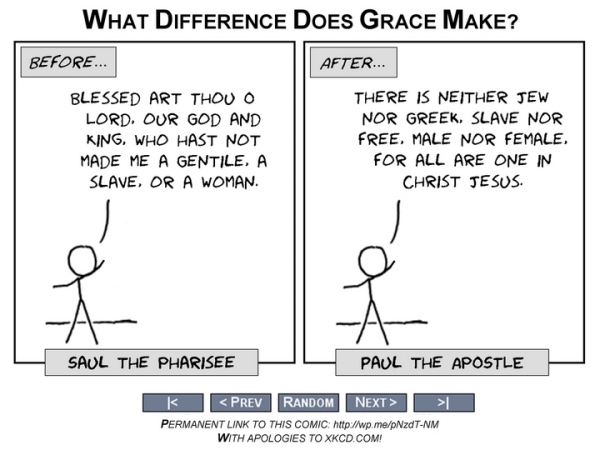What Does 1 Peter 3:7 Mean?
Hindered husbands, weaker wives?! What's that about?
A man recently asked me about a troubling verse. “My wife says my prayers are hindered because I don’t respect her enough.” He was referring to this verse:
Husbands, in the same way be considerate as you live with your wives, and treat them with respect as the weaker partner and as heirs with you of the gracious gift of life, so that nothing will hinder your prayers. (1 Peter 3:7)
What does it mean to hinder your prayers? Here is the wrong answer: “God doesn’t listen to jerks.”
The good news is that God does hear the honest prayers of jerks and crooks and thieves and sinners (see Luke 18:14). If you see yourself as a bad husband or a bad wife, rest assured your heavenly Father hears you when you call to him. Our sin does not hinder our prayers.
How do we hinder our prayers?
When I was asked that question, I was stumped. It wasn’t a question I had thought about, but I probably should have since I am a husband.
What can I do to my wife that might hinder my prayers?
Immediately, the Lord brought a picture to my mind that helped me understand this verse. His revelation showed me exactly how husbands (or wives or anyone) can hinder their prayers.
But before I took it any further, I wanted to check what other commentators said about hindered prayers to confirm that I was on the right track. Guess what – they said nothing. I went to all my favorite guys and found they were silent on the subject of hindered prayers.
So I feel very blessed to give you what the Lord has given me, a little insight you will not find anywhere else. (Of course I could be wrong and this verse is so obvious that you already know what I’m going to say about hindered prayers. If so, come back next week. It’ll be better, I promise.)
The weaker partner
In this egalitarian age you won’t hear many men describe their wives as “the weaker partner.” But to the religious mind of the first century, women were considered weaker or inferior in many ways, and this mindset was reflected in the limited participation of women in the Temple and synagogue.
Then Jesus came and made friends with all kinds of women – not just the nice sort of women that you’d take home to meet your mother, but the sort of women that God-fearing men should never talk to.
Jesus taught women (Luke 10:39). He took women with him on ministry trips (Luke 8:1-3). He reached out to women with bad reputations, like the woman at the well (John 4:7). In contrast with the prevailing attitudes of the day Jesus empowered women, and this had a profound effect on the early church:
There is neither Jew nor Greek, slave nor free, male nor female, for you are all one in Christ Jesus. (Galatians 3:28)
When we go to church today we think nothing of women and children participating in the service, but in the first century this would have been offensive to the religious mind. And this brings us to the bit about hindered prayers.
How do we hinder our prayers?
Paul said husbands and wives are co-heirs with Christ, and Peter says the same thing here: “Treat them with respect… as heirs with you of the gracious gift of life.”
Do you see your spouse as a co-heir of grace? Or do you see them as inferior? What about your children and neighbors? What about the person of another race or culture? Are they equal in grace or are they inferior?
If you see others as equal in grace, then you are walking in grace. However, if you see yourself as superior in some way, then you are not walking in grace and your prayers will be hindered. This brings me to the picture that I mentioned earlier:
Before he met the Lord of grace, the apostle Paul was a Pharisee and he would’ve prayed the prayer on the left (source: Encyclopedia Talmudit, Vol.4, Jerusalem 1956, p.371). This is a prideful prayer. Pray like this and you will hinder your prayers.
All of you, clothe yourselves with humility toward one another, because, “God opposes the proud but gives grace to the humble.” (1 Peter 5:5)
Whose prayers are hindered? It is those who boast, “Thank you God that I am not like other people” (Luke 18:11). It is those who see themselves as better than others. It is those who sacrifice people on the altar of their convictions. Such people have trouble receiving grace because they don’t see their need for it. Their pride hinders their prayers.
Religion kills grace and hinders prayers. Performance-based religion says if you deliver the goods – if you avoid sin and behave yourself – you’ll get a direct line to God. It’s not true! All you’ll get is a mirror for admiring yourself. “I fast twice a week and give a tenth of all I get” (Luke 18:12).
Do you really think God is impressed with your sacrifice when you are not impressed with his?
God doesn’t bless us in accordance with our output but in accordance with the riches of his grace. This is why religious superstars are often further from God’s grace than tax collectors and prostitutes (Matt 21:31).
How do we un-hinder our prayers?
Finally, all of you, live in harmony with one another; be sympathetic, love as brothers, be compassionate and humble. (1 Peter 3:8)
It’s easy to be humble with the Lord, but Peter exhorts us to be humble with each other: wives to husbands, husbands to wives. To quote CS Lewis, humility isn’t thinking less of yourself, but thinking of yourself less. It is having a Biblical view of women and being compassionate and loving one another. This is a key for receiving God’s grace, because grace flows to us through people.
Want more grace in your marriage? Thank God that he has blessed you with a partner in grace.
Want more grace in your family? Thank him for your kids who are co-heirs in Christ.
Want more grace in your church? Then “clothe yourselves with humility toward one another,” and praise him for surrounding you with such towering testimonies of grace.
Who are you thanking God for today?
___________
Enjoy this article? Sign up to our free email list and we’ll notify you about new articles as soon they come out.
Escape to Reality is proclaiming the good news everywhere thanks to the support of readers:






I don’t disagree with this conclusion whatsoever, as we cannot be in a mindset of “praying without ceasing” unless we understand grace. However, this particular verse may have a more simple and practical meaning. It has been my understanding for awhile,that this phrase is in the plural (confirmed by Andrew Farley as this question was asked on his radio program). Meaning your praying together is hindered, rather than private praying, which is kind of “duh”. This makes sense in context as Peter was trying to get them to see their wife as an equal partner in Christ. In the end, the application is the same as what you said of course.
The “your” in “your prayers” is a “personal pronoun of the second person singular” according to Strongs. The plural version of your is a different word. It seems clear from that and the context that Peter it is referring to the husband’s prayer (or husbands’ prayers). But I agree that husbands who look down on their wives probably don’t pray with them. Thanks for the comment.
I am a bit confused. I admit I had responded from memory of my study several years ago, and generally AF is trustworthy with words, so I checked it out again. I generally use BibleHub for my research, and perhaps they have it wrong, but it shows the word hymōn (the prayers of ‘you’ (hymōn)) as being PPro-G2P. The same site states this is “Genetive 2nd Person Plural”. Again, doesn’t change the truth of what you wrote, but curious if I am missing something. You have my email if you wanted to take this private. Appreciate all you do to defend grace. I pretty much re-read Hypergrace Gospel about once a month to keep me reminded of these truths.
What is the original word for your in “your prayers”? I did a little more digging because I could not see where you were getting the word hymōn (G5216). It does not appear in a modern word-for-word translation such as the ESV (as you can see here). But it does appear in the KJV (as you can see here). The ESV has sy (G4771).
These are clearly different words. Sy refers to the “person pronoun of the second person singular” as I have said, while hymōn is the plural version, as you have said.
Why the different words? I don’t know. Perhaps the translators relied on different manuscripts. But I don’t see any inconsistency in meaning. Whether the older translations are referring to you husbands or the modern translations are referring to you husband, the message is the same. Peter is talking to husbands, not couples. The hint is in the first word of the verse. He is saying husbands hinder their prayers through pride.
Saint Paul,
You’ve done an excellent report of the meaning behind *1 Peter 3:7*. Thank you brother for helping me to make sense of this verse. I too have struggled with it’s meaning. Your comments have cleared this up.
Thank so much,
Steve Scheffler
I agree with Paul’s conclusion and analysis of 1 Pet 3:7, but I respectfully disagree with the statement that “our sin does not hinder our prayers.” I have read his well written article of Nov. 18, 2021 and the comments related to it. However, I believe the Bible teaches that there are hindrances to prayer life…
Thank you for taking the time to comment. Please note, this is the discussion thread for the 1 Peter 3:7 article. If you have comments on any other article, you are welcome to post them under those articles.
“Do you really think God is impressed with your sacrifice when you are not impressed with his?”
The entire performance mentality of organized religion laid to waste in a single sentence!
I think you are getting the hang of this writing thing, brother!